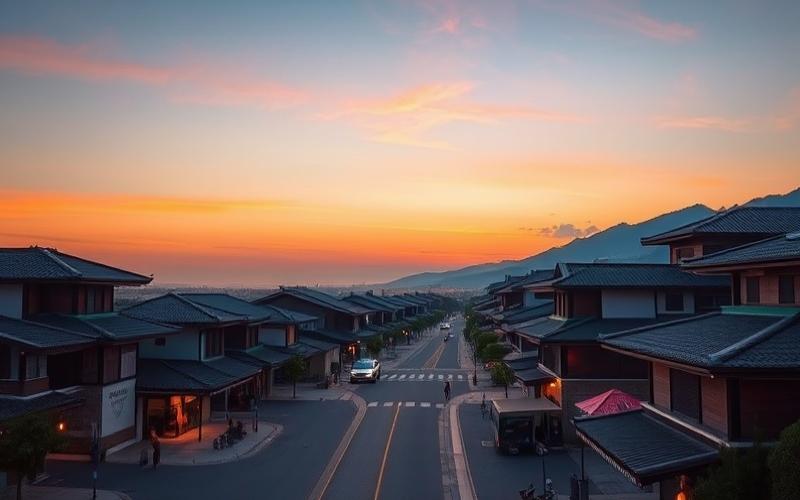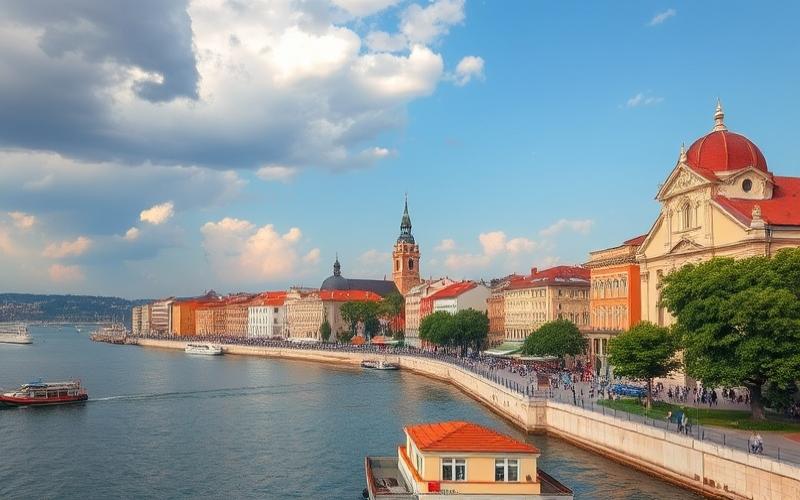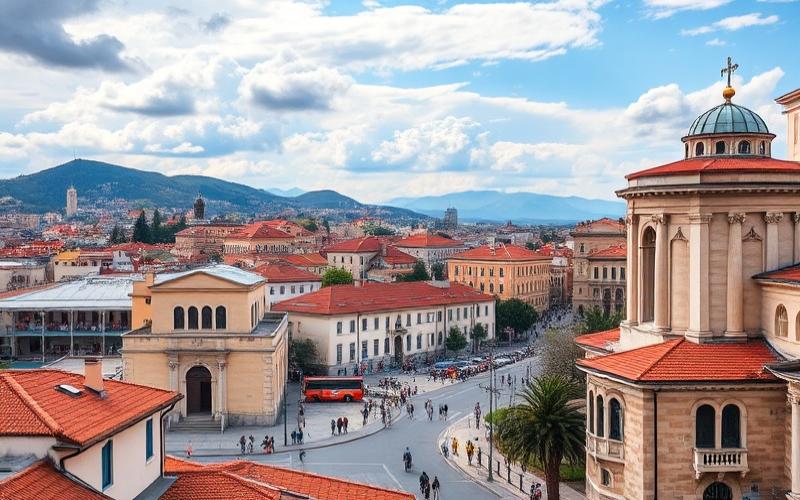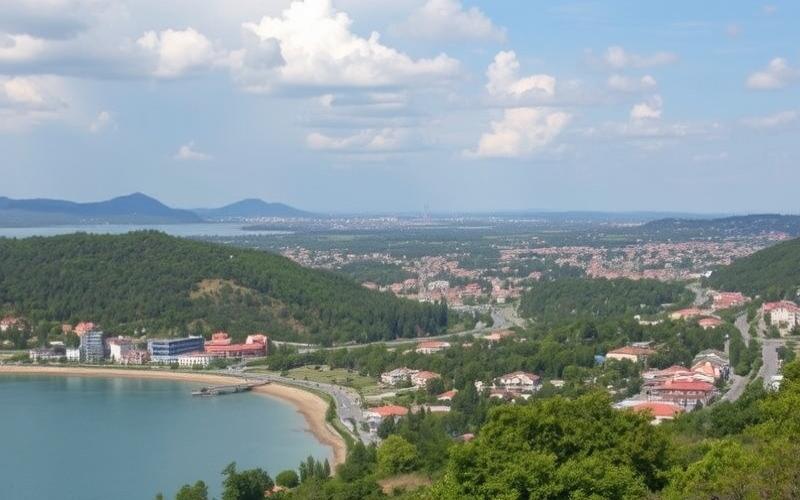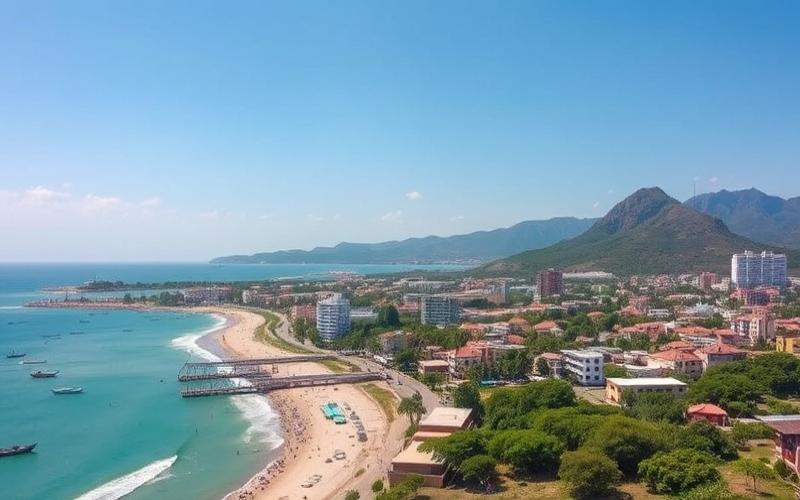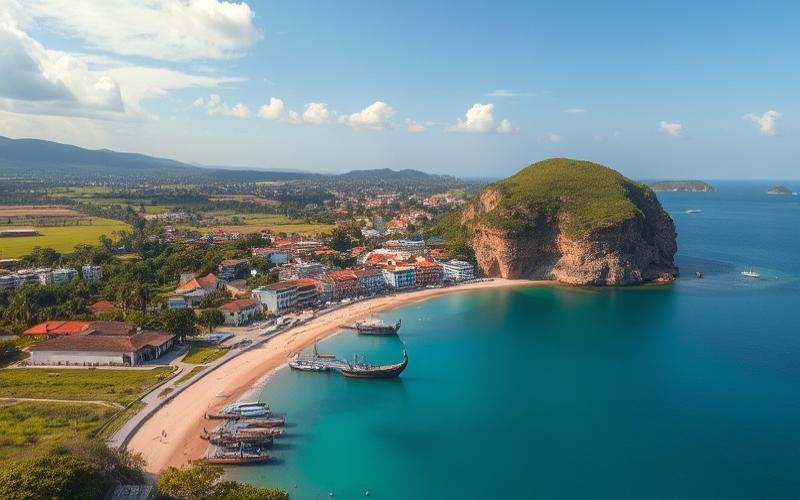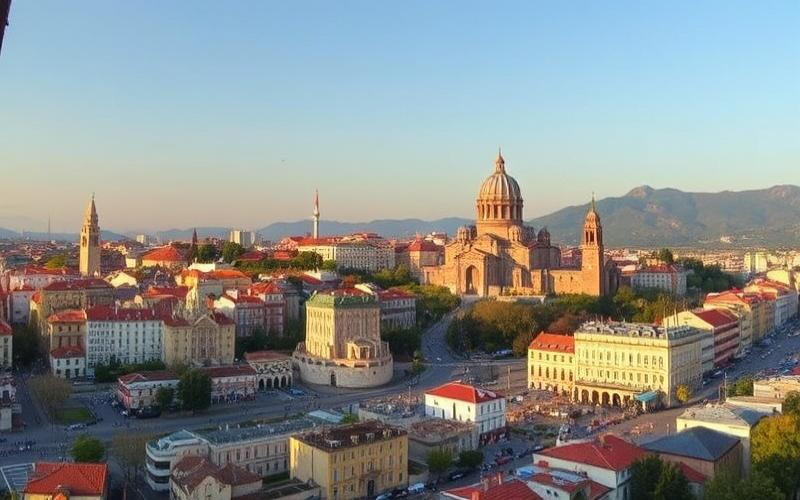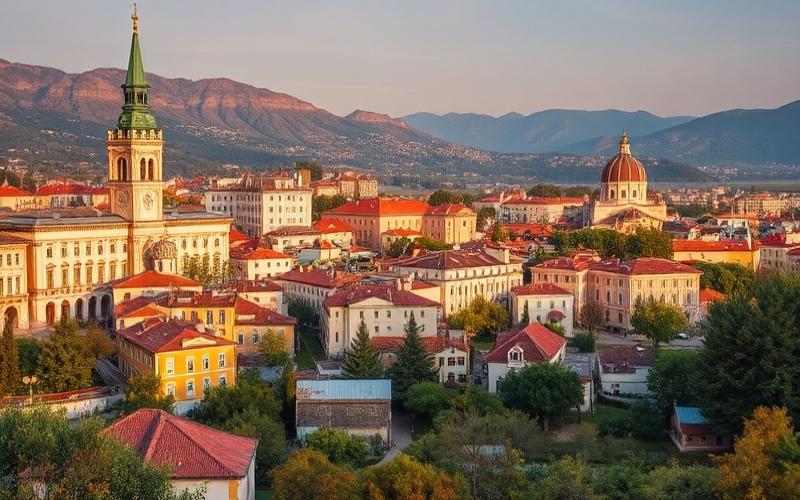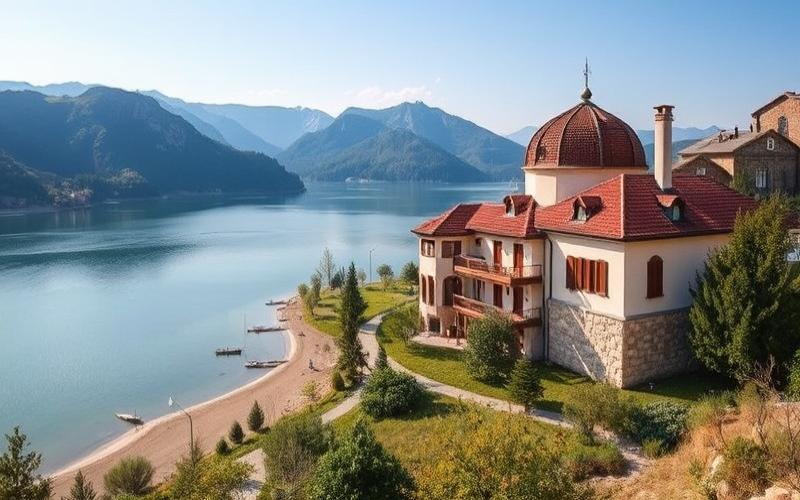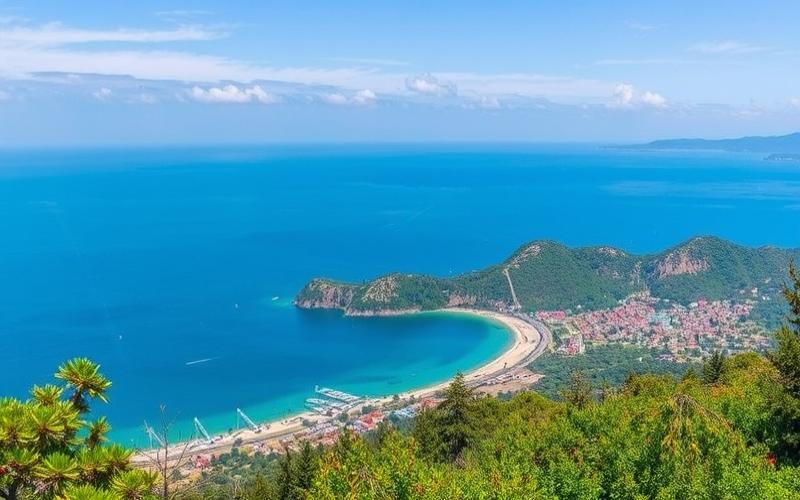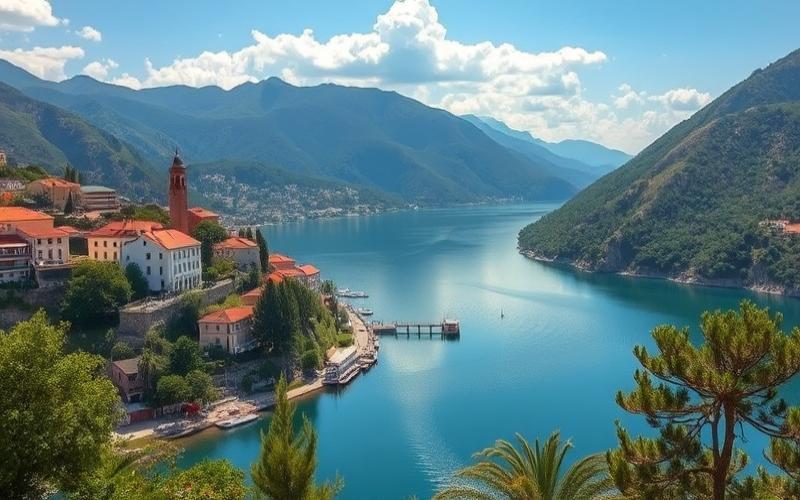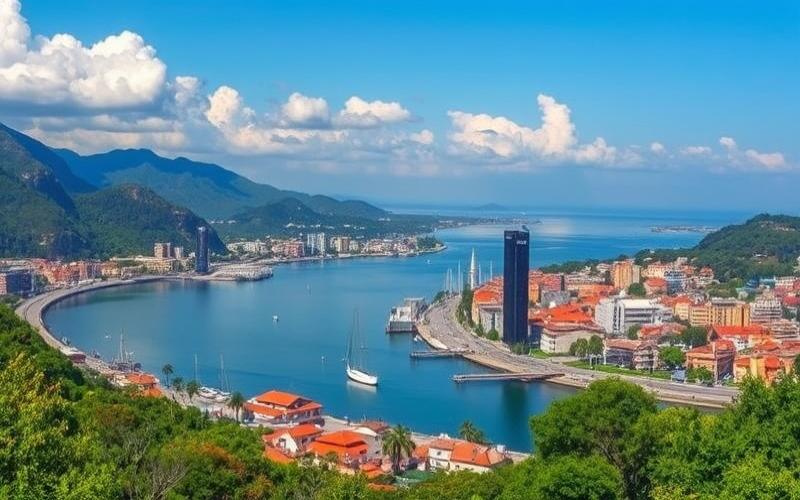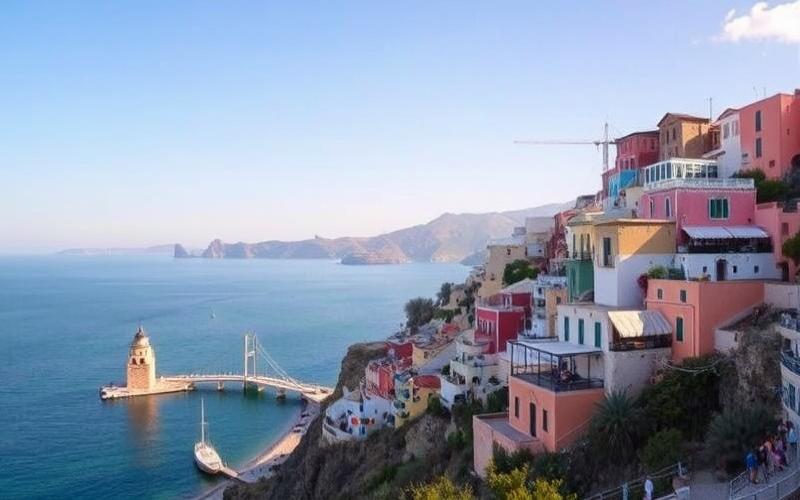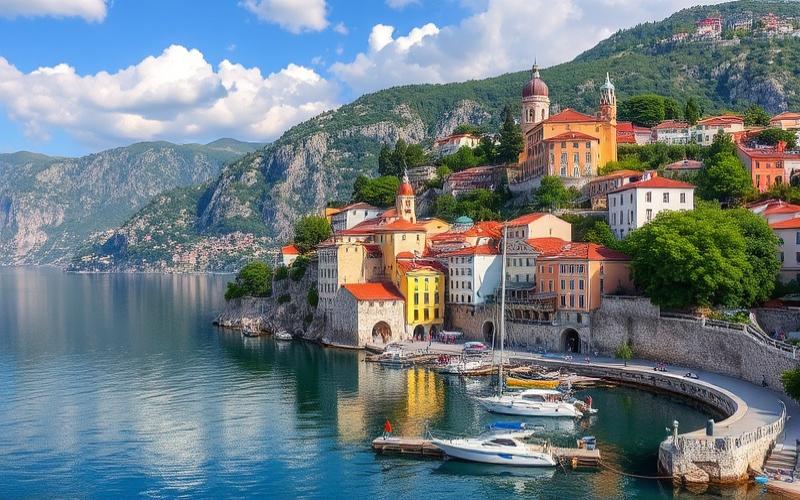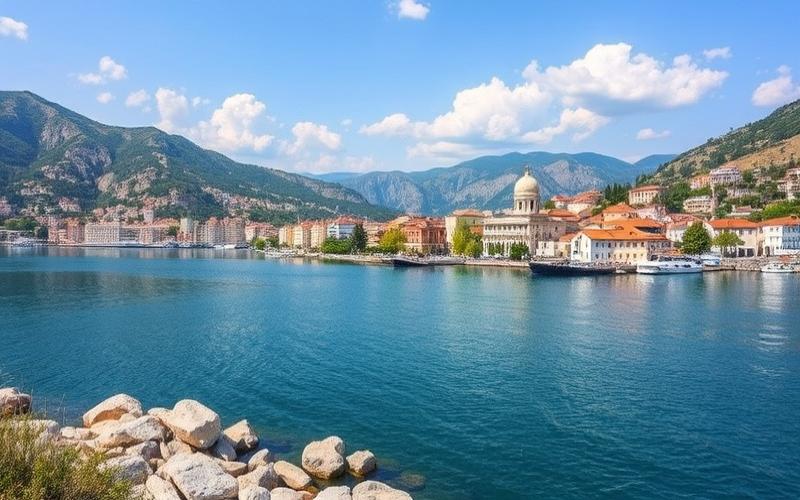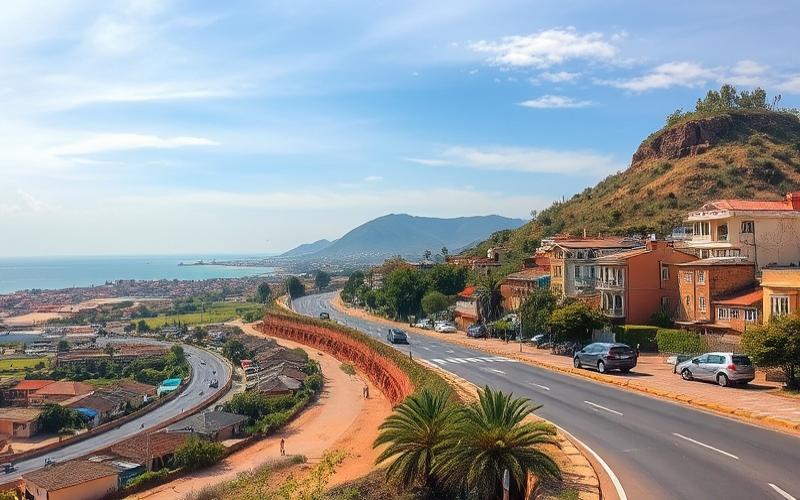
 Published on and written by Cyril Jarnias
Published on and written by Cyril Jarnias
Facing growing demand for affordable housing in a tense economic context, micro-apartments are emerging in North Macedonia as a relevant solution for tight budgets. These compact living spaces not only offer a financially viable alternative but also provide an innovative response to the challenges of increasing urbanization and reduced available space in major cities.
While maximizing the use of every square meter, these modern dwellings promise to redefine urban living, while appealing to an audience eager to minimize ecological footprint.
Expansion of the Microliving Concept in North Macedonia
The rise of microliving in North Macedonia is primarily observed in urban areas, with notable concentration in Skopje, the capital and only city with over 75,000 inhabitants. This trend responds to urban population growth and the need to optimize available spaces, as urban density steadily increases.
Real estate developers and investors see considerable economic potential in micro-apartments:
- High profitability per square meter
- Growing demand among young professionals, students, and single individuals
- Low maintenance costs
- Rapid tenant turnover
This market is particularly attractive due to:
- A high occupancy rate in central neighborhoods
- The possibility of offering competitive rents while maximizing rental yield
| Economic Factors | Impact on Microliving |
|---|---|
| Increase in land cost | Encouragement to build smaller |
| Rapid urbanization | Rising demand for small housing |
| Attractiveness to investors | Increased development of microliving offerings |
On the regulatory side, the government has implemented certain policies that could influence this expansion:
- Occasional tax incentives favor investment in new residential real estate intended for young professionals.
- However, regulations exist regarding the minimum legal housing size, which can sometimes hinder supply if these standards are not adapted to current economic or social realities.
- Some municipalities are currently considering a temporary or targeted relaxation of minimum thresholds to encourage architectural innovation.
The market is experiencing measurable growth:
According to the latest available statistics, the number of permits issued for apartments under 35 m² increased by approximately 18% between 2023 and 2025. Several recent projects in Skopje show an occupancy rate exceeding 95% upon delivery.
Concrete examples:
- The “City MicroLoft” complex inaugurated in early 2024 in the city center offers nearly 120 units, all rented within six months of opening.
- In Bitola, a pilot project dedicated to students saw reservations exceed its capacity even before completion.
Social and cultural challenges related to microliving remain significant:
- Necessary psychological adaptation to living in less space (sometimes less than 25 m²)
- Increased need for shared common spaces (collective laundry, coworking)
- Perceived risk by some residents regarding quality of life or privacy
Public perception is gradually evolving thanks to the following initiatives:
- Municipal campaigns informing about ecological benefits (reduced energy consumption),
- Regular organization by some developers of open house days, allowing the public to experience these new spaces,
- University partnerships conducting sociological studies aimed at deconstructing prejudices associated with urban minimalist lifestyles.
Finally, although some segments remain attached to traditional family models – often synonymous with larger spaces – there is growing acceptance of the concept among mobile urban generations who prioritize flexibility and proximity to their workplace or university.
Good to Know:
The expansion of microliving in North Macedonia is accelerating, especially in urban areas like Skopje, where demand for affordable housing is growing. Real estate developers see significant economic potential in these micro-apartments, sometimes supported by tax incentives, although regulations on minimum housing size can pose obstacles. Recent statistics show a notable increase in microliving projects, with constructions already completed in Skopje. Social and cultural adaptation to small spaces remains a challenge, but it is partly offset by educational campaigns aimed at raising public awareness of the economic and ecological benefits of microliving. Public perception remains mixed, but the efficiency of space use encourages growing acceptance, while the government considers policies to harmonize these new trends with traditional housing needs.
Investing in a Studio: The New Eldorado for Tight Budgets
Purchasing a studio in North Macedonia presents numerous economic advantages, particularly for investors or first-time buyers with limited budgets.
Financial Accessibility
The average price for a studio rental is around €214 per month in the suburbs and €305 in the city center. These amounts remain significantly lower than those in most European countries, making property access more affordable for a wide audience. In provincial areas (Ohrid, Bitola, Tetovo), it is possible to find studios between €150 and €250/month.
Comparison with Larger Apartments:
| Housing Type | City Center (€/month) | Other Cities (€/month) |
|---|---|---|
| Studio / 1 room | 200 – 300 | 150 – 250 |
| 2-bedroom apartment | 300 – 450 | 200 – 350 |
| 3-bedroom apartment | 400 – 600 | 300 – 450 |
- Reduced initial cost:
- Lower price per square meter
- Proportionally lower notary fees and taxes
- Controlled maintenance fees:
- Reduced monthly rental charges (electricity/water/heating between €50 and €100/month)
- Moderate annual home insurance (approximately €100/year)
- Attractive rental yield:
- Strong demand for small spaces in major university or tourist cities like Skopje or Ohrid
- High occupancy rate due to rent accessibility for young professionals, students, or tourists
- Possibility of seasonal rental with higher yield in certain markets
Recent Real Estate Market Trends:
- Studios currently benefit from growing demand linked to increased urban mobility and tourism development.
- Prices have remained stable despite a gradual increase in demand in urban centers.
- Monetary fluctuations have had little impact on local prices expressed in Macedonian denar.
Positive Social and Urban Impact
The construction and increased supply of studios meet urgent affordable housing needs in metropolitan areas. They enable:
- Combating the housing shortage without further artificial land use.
- Offering a flexible solution for young workers or students seeking independence quickly.
- Encouraging reasoned urban densification, facilitating access to public services without significantly increasing pressure on existing infrastructure.
In summary, the studio is establishing itself as a smart investment compared to larger apartments thanks to its reduced costs, high rental profitability, and ability to satisfy both social and economic demand.
Good to Know:
Investing in a studio in North Macedonia proves to be a financially wise solution for investors with tight budgets, offering acquisition and maintenance costs significantly lower than those of more spacious apartments. Studios, whose demand is strongly growing in major cities like Skopje, are becoming increasingly popular due to their attractive rental yield, an ideal option for young professionals and students seeking affordable housing. The local real estate market recently showed a 5% increase in studio prices over the past year, reflecting growing interest in this property category. Moreover, micro-apartments contribute to urban densification while meeting pressing housing needs, making studios an essential lever for revitalizing certain neighborhoods and offering better space utilization in central areas.
Micro-Apartments: An Economic Response to Modern Needs
Definition and Characteristics of Micro-Apartments
A micro-apartment is a dwelling whose living area is generally less than 30 m², sometimes even under 20 m² in some major cities. Internationally, they often fall below the threshold of 500 square feet (approximately 46 m²), but in Central and Eastern Europe, this area tends towards 18–28 m². The main architectural features that optimize these small spaces include:
- Multifunctional furniture (fold-away beds, built-in storage)
- Open spaces without unnecessary partitions
- Exploited ceiling height with mezzanines or high storage
- Maximum use of natural light to visually enlarge the space
- Frequent presence of common spaces in the building: shared lounge, rooftop terrace, or gym
“Since every room in the micro-apartment is used daily… it is necessary that everything is well-organized and that every object has a specific purpose”
From a real estate sector expert
Economic and Social Context in North Macedonia
In North Macedonia, several economic factors are pushing towards more compact housing:
- Rapid urbanization around major centers like Skopje, Bitola, or Ohrid
- Continuous increase in the average price per square meter in central neighborhoods
- Limited incomes among young professionals and students who struggle to access traditional apartments
- Growing need for affordable solutions to address the urban housing shortage
The monthly cost of a studio or one-room apartment in the city center ranges between €200–300 per month, which remains low compared to Western Europe but represents a significant financial effort for a substantial portion of local households.
Economic Advantages of Micro-Apartments
The main economic benefits offered by these dwellings are:
Increased Financial Accessibility:
- Reduced rents suitable for tight budgets (students/young professionals)
Overall Reduction in Charges:
- Lower energy bills due to small heated/cooled area
Administrative Simplicity:
- Less expensive in terms of home insurance (~€100/year)
This model therefore directly addresses the housing crisis observed in Macedonian urban centers where demand far exceeds supply.
Impact on Modern Lifestyle
Micro-apartments perfectly adapt to contemporary requirements:
- Promote mobility and flexibility, ideal for people frequently working away from home or changing cities often
- Encourage a minimalist lifestyle – less material clutter
- Offer enhanced connectivity via affordable high-speed internet (€15–25/month)
- Often integrate direct access to shared services: communal laundry, coworking space…
“This type of housing offers more than just a place to sleep: it’s a whole ‘connected urban’ lifestyle that particularly appeals to Generation Z”
Comparison with Global Trends
| Aspect | North Macedonia | Japan/Korea | Canada/France |
|---|---|---|---|
| Typical Size | 18–28 m² | Yield and benefits of small spaces in the real estate market |
The North Macedonian real estate market is currently experiencing positive dynamics, with rising prices and growing interest in rental investments, particularly in micro-apartments. Recent data indicate an average price per square meter in the city of approximately €1,783 to €1,867, representing an increase of over 5% in one year and a steady upward trend over the past two years.
Micro-apartments present several key advantages for investors:
- Reduced acquisition cost: Purchasing a small space involves a lower initial investment compared to traditional apartments, facilitating market access even for tight budgets.
- High profitability: The average rent in the region stands around €6.37/m², favoring the profitability of small spaces often rented at rates higher per square meter compared to larger dwellings.
- Limited maintenance fees: Less space means fewer charges (heating, general maintenance), thus reducing the total cost for the owner.
Here is a comparative summary:
| Criterion | Micro-Apartment | Traditional Apartment |
|---|---|---|
| Purchase price (m²) | Lower | Higher |
| Rental yield (%) | Potentially superior | Average |
| Maintenance costs | Low | Moderate/high |
| Expected occupancy rate | High | Variable |
Additional advantages of micro-apartments:
- Increased financial accessibility, allowing more investors or first-time buyers to position themselves in the local market.
- Reduced ecological impact thanks to lower energy consumption and optimized use of urban space.
- Adaptation to new urban lifestyles (increased professional mobility, partial telework), thus responding to growing demand among young professionals and students.
A concrete example is observable in the city center where demand remains strong despite the recent increase in price per square meter. Investors can acquire a studio or micro-apartment around 30 m² for approximately €54,000, while their rental quickly generates stable income given the high occupancy rate.
Micro-apartments today constitute a particularly attractive solution in the Macedonian real estate market: low initial cost, good rental profitability, and perfect adaptation to contemporary needs make them appealing to both investors and residents with limited budgets.
Good to Know:
In North Macedonia, micro-apartments represent a booming market niche, attracting investors with their attractive yield. Indeed, the reduction in acquisition and maintenance costs generally allows for higher profitability compared to traditional apartments. Unlike larger spaces, these compact areas benefit from a often lower price per square meter, making them accessible to buyers with tight budgets. Moreover, their restricted size translates into a lower ecological impact, contributing to addressing growing environmental concerns. According to a local study, the high occupancy rate of these dwellings demonstrates their popularity among tenants seeking economical solutions tailored to a modern lifestyle. A recent example in Skopje illustrates this trend, where a micro-apartment complex recorded full occupancy in less than three months after being marketed, attesting to the lasting attractiveness of this segment for investors.
Disclaimer: The information provided on this website is for informational purposes only and does not constitute financial, legal, or professional advice. We encourage you to consult qualified experts before making any investment, real estate, or expatriation decisions. Although we strive to maintain up-to-date and accurate information, we do not guarantee the completeness, accuracy, or timeliness of the proposed content. As investment and expatriation involve risks, we disclaim any liability for potential losses or damages arising from the use of this site. Your use of this site confirms your acceptance of these terms and your understanding of the associated risks.


